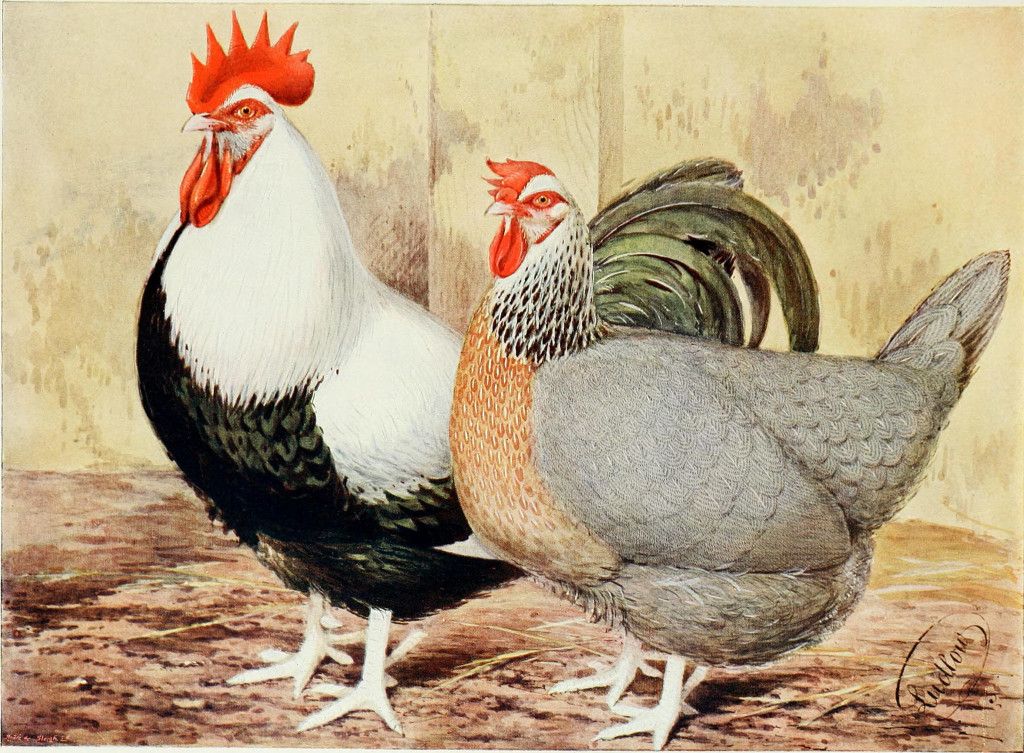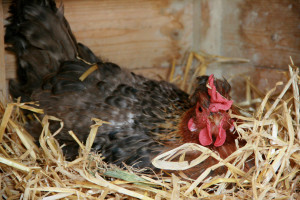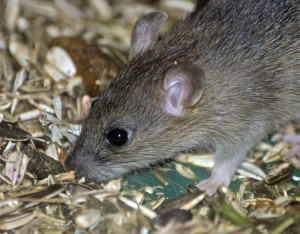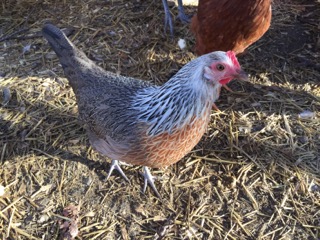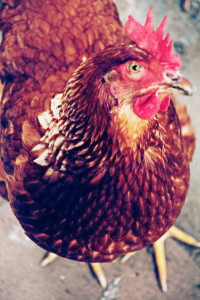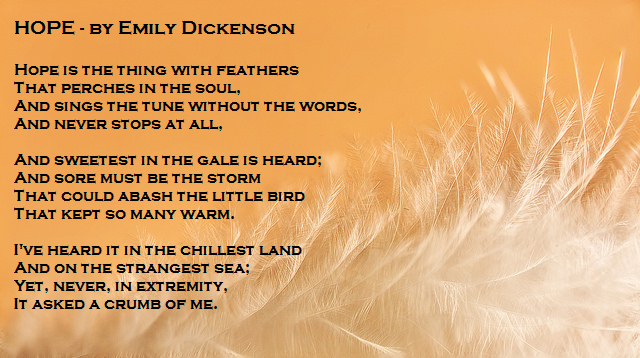It is time again for another session of Urban Chicken Podcast Listeners’ questions and answers. This Q and A session we consider and discuss ISA Brown chickens, a rooster who is acting like a hen, issues with spilt feed in the coop, identify a mystery breed hen, and hear about another crowing hen!
A few weeks ago I received several questions from Urban Chicken Podcast listener Ahmad Eido in a couple different emails. Ahmad is relatively new to keeping backyard chickens – most of his flock being rescue birds from his local humane society animal shelter. Here are the first two questions Ahmad posed in his initial email:
Hi Jen,
I hope all your flock babies are doing well. I have 2 questions for you.
1.) I have 6 hens and one rooster … they are about 8 months old [and] just starting to lay eggs. I went in the coop today to check on the water and freshen their bedding and … as i was in there, the rooster “Rocko” ([by the way] I love this bird so much) jumped in the laying boxes next to me and starting clucking like a laying hen. He then laid in the middle and looked at me like a broody hen. What do you think that means? Is that a normal occurrence?2.) My flock does not free range as of yet – I have a large pen attached to my coop. … I went to check on [my flock] and give them some treats …. and I noticed that the 30lb metal feeder that I use is almost empty, even though I filled most of it 2 days ago. All the feed is on the ground around the feeder. My chickens have never done that since I [have] had them. As I was investigating the site, I noticed that there was blood on the walls of the feeder. I checked all my flock one at a time and none of them has any injuries … and there no evidence of a predator or any forced entry to the pen. What do you think happened? I’m very concerned.
Thank you so much for all your great podcast, keep up the good work.
Your Avid Listener – Ahmad
These are both rather unusual questions and my answers are more experiential and anecdotal in nature than scientifically based. It is difficult, if not impossible to give an absolute answer to either of these inquiries.
ROOSTER ACTING LIKE A BROODY HEN
Let’s start with issue of the rooster behaving like a broody hen. According to Ahmad, Rocko the rooster one day decides to strangely climb into a nesting box, cluck like a hen
and pretend to be broody. Yup – that is some pretty odd behavior for a rooster. However, I suspect the cause of this rooster’s nuttiness is not as enigmatic as one might initially assume.
All animals, chickens included, are as individualized and full of unique personalities as humans. Consider how bizarre some humans act from time to time. Often there is not a reasonable explanation for their behavior – perhaps the individual was just feeling a bit silly or kookie that day or perhaps acting in such a way for their own amusement. Anyone who has ever owned a regular household pet would be able to recount how these dogs or cats have acted playfully and silly just for fun. Arguably, chickens are no different.
Here is a similar example from my own life. My sister owns a Black Copper Marans rooster named Napoleon. Recently, when one of the hens was laying eggs and crying out her “egg-song,” Napoleon began to mimic her. He was not clearly crowing – he was very carefully echoing this hen’s egg-song. Why was Napoleon sing a hen’s song? Truthfully, I have no idea. I suspect he was doing it for his own amusement or perhaps out of some deep-seeded rooster neurosis. However, Napoleon is not the only rooster to take up mimicking the “egg-song.”
Rooster Singing Hen’s Egg-Song:
Napoleon has not demonstrated any other female like behavior. If Rocko has not done anything more than act a little crazy that one day, I would not read too much into it. However, should Rocko begin to regularly behave as though he were a hen, that would be something different.
There are a few reports of roosters sex-reversing into hens, though those reports are not generally substantiated. More commonly are reports and studies on various species of animals (several of which are birds) exhibiting “homosexual” behaviors in the wild. There are reports of pairs of male birds partnering up and running female birds off of their nests to take-over the care and hatching of eggs. This is not likely to be the issue with Rocko – he was probably just being playful around with his owner.
If Rocko continues to behave like a hen or if any other Urban Chicken Podcast listener’s roosters (or hens) are behaving like the opposite sex, please let me know. I am conducting an informal study on sex-reversed chickens and looking to see if there is any correlation with the rise of rooster-free backyard flocks with that phenomenon.
CAUSE OF MISSING/SPILT FEED IN THE COOP
The second question Ahmad asked was to help him find the source of missing and spilt feed in his coop. This is sort of a “whodunnit” mystery question. Since I have never visited Ahmad’s coop or seen his flock in action, I can only make an educated guess at the cause of his feed troubles.
The evidence list of facts in this case to consider are as follows: 1) an unusual amount of feed was consumed; 2) though it is generally common for chickens to scratch in their feeders and waste feed, this is not a behavior his flock has ever shown; 3) there was a smear of blood inside the metal feeder, but none of his birds were injured when he checked each of them individually, and 4) there was no signs of a forced entry into the coop.
Assuming that all of the facts provided by Ahmad were correct and there is no additional omitted evidence the most likely answer is that his own flock is guilty for this mess. Chickens are notorious about spilling their feed and could have done so on this occasion for the first time. Moreover, it is highly possible that the injury that cause the blood smear was simply overlooked.
However, if flock did not cause this mess in Ahmad’s coop and an outside culprit is to blame, then the likely offender was either a rat or mouse (or a similar rodent). It is very common for open and available feed in a coop to attract entrepreneurial vermin. Rodents have voracious appetites and can eat and stash remarkable amounts of food. Additionally, rodents are well known for being able to shimmy through small gaps in what appears to be a secure structure. Consequently, it is not surprising that the coop showed no evidence of a “break-in” by an outside animal. The blood smear might have been cause by the rodent cutting itself when squeezing through a tight gap to get into the coop. Alternatively, perhaps the chickens saw the little interloper in their feeder and spilt the feed while putting an end to this intruder. Remember, chickens eat mice. It is not so far-fetched that a thieving mouse came to a bad end inside the coop.
If Ahmad is convinced that it is an outside culprit to blame, then he would be well-served to put out some mouse traps around the coop placed where neither chickens or other pets could reach and see if he catches any rodents. It is imperative to take a proactive stance when dealing with rodent issues. Rodents bring bother disease and pests (e.g. fleas, ticks, lice) into chicken coops. These vermin can be determined and chew holes through plastic and wood to reach food sources. Ultimately, if left unchecked, rodents can cost a flock owner significant money and energy.
IDENTIFY THE MYSTERY CHICKEN BREED
As mentioned earlier, Ahmad posed a third question in a second email. Here is what he asked in that second message:
Hi Jen,
I want to thank you for your great podcast. I have just found your podcast and now I am hooked and starting to listen back to all of your older podcast [episodes].
Since I was a little kid, I wanted chickens for myself as pets. We lived in Beirut, Lebanon, which is a large city, in an apartment so there was no way for me to get chickens.
Two months ago, I bought a 12 acre property in the U.S. and I just bought my first coop [and flock of] six hens and one rooster. My flock is made up of:
-“Ethel,” a Barnivelder from a breeder;
-“Gertrude,” my Ameraucana (who was a shelter adoption);
-“Louise,” an amber sex-link;
-“Lucy,” a Rhode Island Red shelter rescue hen;
-“Rocko” a beautiful Buff French Marans (he was also rescued from almost being slaughtered); and …
-“Rosie,” my mystery hen who was also a shelter rescue.
I adopted most of them from the Humane Society that I work at. I LOVE my chickens!
…
I am attaching [for] you some pictures of … my baby girl Rosie, the mystery hen. Hopefully you can identify what breed Rosie is. She is much smaller than the rest of the flock as she is only about 2-3 lbs. I am not sure if she is a bantam.
I just wanted to thank you for your awesome podcast and please keep up the good work. I have learned lots of things from listening to you. You will hear from me again with questions. — Ahmad
I have carefully examined the picture of Rosie the small, mystery hen and believe I know exactly what chicken breed she is. However, I want you to have a chance to try to identify the breed. Share your guess at her breed in either the Facebook comments or Twitter feed for this UCP episode. I will reveal the answer during the next podcast. See if you can identify Rosie’s breed!
ISA BROWNS IN AMERICA
Recently, Urban Chicken Podcast listener, Patrick Hallene, (author of the backyard farming website called the Little Country House) wrote to share some information about ISA Browns with all of the UCP audience.
In UCP Episode 055, I discussed sex-linking in chickens and briefly talked about ISA Brown sex-link chickens. If you did not listen to UCP Episode 055, ISA Brown is short for Institut de Selection Animale, which was the European company that developed this sex-linked hybrid by crossing Rhode Island Reds with Rhode Island Whites. In that episode, I mentioned that ISA Browns were fairly rare to find in the United States.
Patrick wrote to share that he has some ISA Brown hens and his thoughts on this sex-linked breed. Here is what Patrick wrote:
Hey Jen,
I just wanted to tell you I have a couple Isa Brown hens. I live in SW Ohio and purchased them from our local Ag store, Rural King. They lay wonderful large brown, thick shelled eggs. I have read they stop laying reliable eggs after two years. From what I understand, the eggs stop being uniform and can become misshapen. My hens are in their first year. They have a great temperament and are beautiful. Thought I would pass this info along. You can get them in US now. Not sure how long they have been available. I recommend them!
Take care — Patrick
After Patrick’s email I did a little google hunting and found that ISA Browns are available for sale through the mail (or locally if you happen to live in southwestern Ohio near the Rural King Ag Store). One of the reliable retailers of ISA Brown chicks I found in the United States was Purely Poultry.
If you also keep ISA Brown chickens please share what you think of this breed and where you bought your birds. Please post that information on the Urban Chicken Podcast Facebook page.
ANOTHER SEX-REVERSED HEN?
The last Urban Chicken Podcast listener contact for this episode was a tweet that I received from Deena Anreise a couple months ago, reporting a possible sex-reversed hen. Here is what Deena tweeted:
Help! My BEST layer has started randomly crowing like a rooster. She’s 10 months old.
I tweeted Deena back and asked whether her young hen was laying and if she had physically changed in any way (i.e. grown spurs, longer waddles, etc).Deena answered me with the following additional information:
They’ve all stopped laying. Winter? Not much has changed [with] her appearance & she only crows occasionally.
About a month later I sent Deena a follow Tweet asking if the bird was still crowing like a rooster and not laying eggs. Deena tweeted her answer:
She cries a bunch in the mornings but not other times. She’s NOTHING the dominant of the group. And she DOES lay. So odd 🙁
Based on this information, I do not believe that her crowing hen is an actual sex-reversed bird. The fact that there are no other indications of sex reversal (physically of behaviorally) suggests that that the hen is simply trying to show her dominance in the pecking order. Even though this little hen is not the dominant bird in the flock, she could still be crowing to gain some stature in the pecking order. I do not suspect that her left ovary has failed and triggered a sex-reversal, especially since the bird is so young. Perhaps this is a situation similar to Rocko the rooster, yet another chicken acting nutty for no apparent reason.
I have added Deena’s crowing hen to the Spontaneous Sex-Reversed Chickens study chart located on the Urban Chicken Podcast website HERE.
DEDICATION OF UCP EPISODE 058 TO LISTENER MARIE GLADWELL
This episode of the Urban Chicken Podcast is dedicated to listener Marie Gladwell of Arkansas. I am thinking of Marie as she fights cancer and praying for her full recovery. Please join me in sending Marie lots of love, support and positive energy. Here is a poem that I learned a very long time ago that made me think of Marie and her current struggles with her health. Hope is our most powerful internal strength – never underestimate its power.
CHICKEN NEWS:
- NY Times – McDonald’s Moving to Antibiotic Free Chicken ARTICLE
- The Dodo – What McDonald’s Antibiotic Free Chicken Move Means ARTICLE
- Yahoo News – McDonald’s Chicken gets New Standard ARTICLE
- Eater – McDonald’s Axes Treated Milk and Chicken ARTICLE
- Here&Now – McDonald’s Phases out Antibiotics from Milk/Chicken AUDIO
- National Geographic – Why the McChicken Crossed the Road ARTICLE
MAIN SEGMENT:
- Wikipedia – Homosexual Behavior in Animals LINK
- Wikipedia – ISA Browns Chickens – LINK
- Purely Poultry – ISA Brown Chicks PAGE
- Townline Hatchery – ISA Brown Chicks PAGE
- Little Country House – Patrick Hallene’s Backyard Farming Blog LINK
- Twitter – Tweets to/from Deena Anreise about Crowing Hen THREAD
SALLY’S SIDENOTES:
- Support the Urban Chicken Podcast by shopping Amazon starting here: Amazon
- If Amazon is not your thing – you could also support the show HERE
Podcast: Play in new window | Download | Embed
Subscribe: Apple Podcasts | RSS

